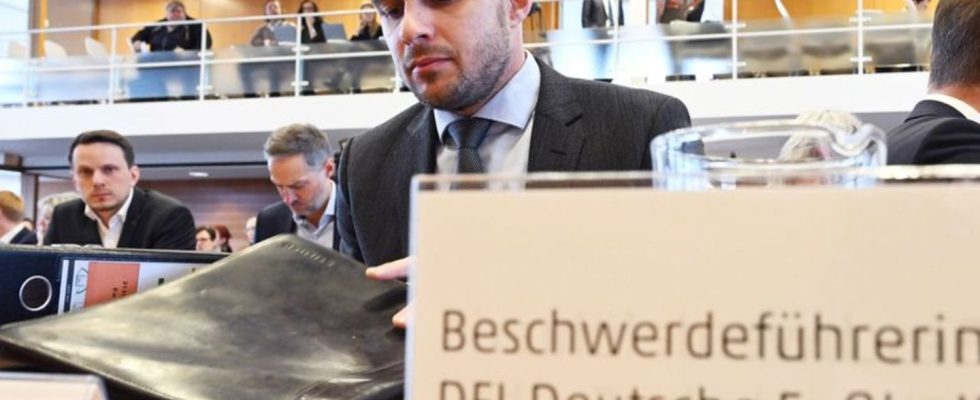process
DFL against Bremen: Who pays for police costs?
DFL managing director Marc Lenz is waiting in the Federal Constitutional Court for the hearing to begin. photo
© Uli Deck/dpa
The Bremen rules on police costs for risky football games have already concerned many lawyers. Now the highest German court is devoting itself to the issue, which also concerns third division clubs.
Who pays if there is a risk of riots at Bundesliga games and more police forces are needed than usual? The Federal Constitutional Court has now decided for the first time in the legal dispute, which has been going on for nine years Karlsruhe is busy – and football right down to the regional league is watching closely.
With the constitutional complaint, the German Football League (DFL) is defending itself against the payment of fees in Bremen for police operations at high-risk games.
The DFL, as the umbrella organization of the 1st and 2nd Bundesliga, sees the financing of police work as the responsibility of the federal states. The city state of Bremen wants to pass on part of the costs to the league. Now the highest German court is supposed to decide. The verdict is not expected for a few months.
Mäurer for DFL participation in police costs
At the beginning of the negotiation, Bremen’s Interior Senator Ulrich Mäurer defended what he saw as the appropriate contribution of professional football to police costs. The federal states continue to be heavily burdened by the additional police effort at Bundesliga games, said the SPD politician. Measures to counteract the potential for violence during the games have not yet had the desired effect: “The taxpayers bear the costs.”
High-risk games are those games in which clashes between fan camps are particularly likely. According to the DFL, there were 52 so-called “red games” out of a total of 612 matches in the 1st and 2nd leagues in the 2022/23 season.
The DFL received its first fee notice in 2015 – for a Bundesliga game between SV Werder Bremen and Hamburger SV. More followed. According to the city of Bremen, total fees amount to more than three million euros, of which the DFL is said to have paid around two million so far.
DFL: “Stadium experience very safe”
The step towards charging fees was not easy for the city state, said Mäurer. He was always concerned with appropriate participation. Mäurer emphasized to the first Senate that only nine games have been classified as “red games” since the controversial regulation was introduced. In the Bremen case, there is only one game per season in which the DFL would be asked to pay. In other European countries, organizers of football games would also have to contribute to the costs. There are 500 to 600 law enforcement officers on duty at normal Bundesliga games in Bremen, and 800 to 1,000 at high-risk games, as was explained at the hearing.
At the start of the negotiations, the DFL emphasized safety at games. “The fact is that the Bundesliga clubs are investing significantly in preventative measures,” said DFL managing director Marc Lenz in Karlsruhe. “It is also a fact that the stadium experience in Germany is very safe. And with up to 20 million spectators per year.”
Football generally has an impact that goes beyond 90 minutes, said Lenz. This includes all aspects of society, all positive but also negative. The police are a very important partner in preventative measures. DFL lawyer Bernd Hoefer warned that fees would overwhelm third division clubs – which play under the umbrella of the German Football Association (DFB). According to DFL lawyer Jürgen Paepke, police costs of 400,000 euros can lead to greater difficulties for a “third division team or for a team in the regional league.”
Essentially, it’s about safety at major events of all kinds, said Lenz about the legal dispute, which has now lasted nine years. Hoefer pointed out that the police costs for climate activists at the motor show in Munich will not be billed to the organizer. In addition, the police would decide for themselves the number of operational hours that would ultimately be billed.
Lawyers’ association: Poor chances for DFL complaint
This point was also of interest to the Chairman of the First Senate at the Federal Constitutional Court, Stephan Harbarth: Whether 400 or 900 police forces are deployed – “Are you holding your thumb to the wind?” The police union (GdP) explained in detail how complex such operations around a game are. That’s why she has a fundamental interest in influencing the working hours.
According to the German Lawyers’ Association, things are not looking good for the DFL’s lawsuit in the legal dispute. “In the end, we see it the same way as the Federal Administrative Court. The DFL’s fundamental rights are not violated,” said Sebastian Nellesen, member of the DAV’s Constitutional Law Committee, before the hearing of the German Press Agency. The controversial paragraph in the Bremen Fees and Contributions Act is constitutional.
“Ultimately it is a political question whether you want to introduce appropriate fees or not,” explained Nellesen. “But this is not a question that the Federal Constitutional Court has to decide.” This decision rests with the legislators, in this case the respective state parliaments. How many countries would follow Bremen’s example if the lawsuit were dismissed remains an open question.

